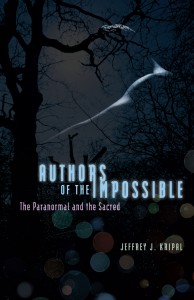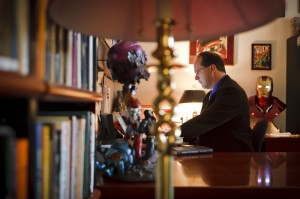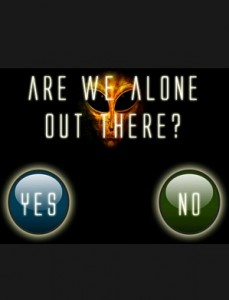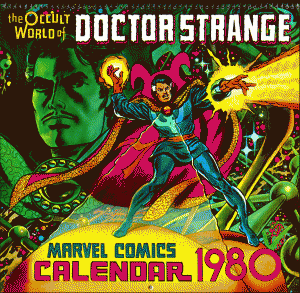 In my research on the paranormal I was fortunate to come across the work of Jeffrey J. Kripal. Kripal is the J. Newton Rayzor Professor in Philosophy and Religious Thought at Rice University. He is the author of a number of books, which are mentioned below, including Authors of the Impossible: The Paranormal and the Sacred (The University of Chicago Press, 2010) with an examination of key contributors to the development of the paranormal and popular culture. I am pleased to discuss this topic with Jeff below.
In my research on the paranormal I was fortunate to come across the work of Jeffrey J. Kripal. Kripal is the J. Newton Rayzor Professor in Philosophy and Religious Thought at Rice University. He is the author of a number of books, which are mentioned below, including Authors of the Impossible: The Paranormal and the Sacred (The University of Chicago Press, 2010) with an examination of key contributors to the development of the paranormal and popular culture. I am pleased to discuss this topic with Jeff below.
TheoFantastique: Jeff, thanks for your willingness to discuss your book and its subject matter here. To begin, the paranormal is not recognized as a legitimate subject matter in the academy, including your discipline in religious studies. In fact, many times scholars shy away from expressing an interest in, let alone exploring the paranormal. What is your personal interest in this, and why do you find this a a legitimate topic for religion scholars?
Jeffrey Kripal: Long story. But I’ll try to keep it short. I came to the subject very late, that is, within the last few years. I was trained as a historian of religions, with a special focus on mystical literature in both India and the West. My fourth book, Esalen: America and the Religion of No Religion (University of Chicago Press, 2007), was on the human potential movement of California. This project put me in direct contact with many modern-day mystics and some fascinating scientists, philosophers, and historians who were writing about topics that I had never considered: psychical research and UFOs, for example. I realized two things fairly quickly: (1) such phenomena are real in the simple sense that they happen and cannot be explained away in every instance as fraudulent, misperception, etc.; and (2) that I had no real way of thinking about these things, and this despite the fact that both are loaded with religious implications (particularly around the nature of mind, consciousness, or what was traditionally called the “soul”). So I set out to try to trace the histories of “the psychical” and “the paranormal” and see where I might locate myself and my field in these histories. It turns out that the terms originated in elite academic contexts (Cambridge, Harvard, and Duke, mostly), but that they were later disciplined and repressed for a variety of (mostly bad) reasons. It must also be said that I underwent a spontaneous mind-blowing paranormal experience in Calcutta in 1989, and that was always in the back of my mind (or in the front of it) too. I wrote about this experience in my second book (Roads of Excess, Palaces of Wisdom [University of Chicago Press, 2001]) and begin with it again in my next book (Mutants and Mystics [University of Chicago Press, forthcoming]).
TheoFantastique: In your book you refer to the “esoteric currents of American popular culture”. Can you share some examples of this for those to whom such currents might not be readily visible?
 Jeffrey Kripal: By this phrase, I mean to point to such things as the way, say, metaphysical energies (or “radiation”) function in the creation of superheroes (think Spider-Man or the Incredible Hulk); or the way, say, the alien functions as a quasi-religious or transcendent figure in the Superman mythos (Superman is basically a crashed alien) or in the classic alien abduction experience; or the way, say, the motif of “mutation” or spiritual evolution enters a mythology like the X-Men or, for that matter again, Superman, that “Man of Tomorrow.” These are scientific-sounding motifs that are in actual fact deeply indebted to earlier esoteric and mystical notions of metamorphosis, magical powers, spiritual flight, transcendence, and so on.
Jeffrey Kripal: By this phrase, I mean to point to such things as the way, say, metaphysical energies (or “radiation”) function in the creation of superheroes (think Spider-Man or the Incredible Hulk); or the way, say, the alien functions as a quasi-religious or transcendent figure in the Superman mythos (Superman is basically a crashed alien) or in the classic alien abduction experience; or the way, say, the motif of “mutation” or spiritual evolution enters a mythology like the X-Men or, for that matter again, Superman, that “Man of Tomorrow.” These are scientific-sounding motifs that are in actual fact deeply indebted to earlier esoteric and mystical notions of metamorphosis, magical powers, spiritual flight, transcendence, and so on.
TheoFantastique: How do you define the paranormal in your book, and how do you see this related to the concept of the sacred as Rudolf Otto referred to it?
Jeffrey Kripal: I define the paranormal as an event or experience in which the assumed division between the subjective or mental and objective or material dimensions of reality breaks down; or, a little differently, when reality begins to behave not in a causal, but in a meaningful or metaphorical way—as if one were caught in a story or movie. Put differently again, I mean an experience in which consciousness appears to manifest itself in the physical world. Think mind-over-matter. I also employ the category of the sacred, which does not mean “the good,” but the sacred as an awesome power encountered in the world that is at once terrifying and beautiful, alluring and dangerous. Hence the paranormal can appear in both positive or negative forms and elicit either fascination or fear, holiness or horror. Or, more likely, both.
TheoFantastique: I’ve seen some discussion in print and on the Internet trying to define science fiction in differentiation from fantasy. The logic seems to go that sci-fi tries to paint scientific worlds of possibility. But it’s interesting to me that many times sci-fi includes elements that appear scientific, such as matter teleportation for example, which is portrayed scientically, but which really appears to be magical or esoteric. Is science fiction at times used to portray the esoteric in ways that makes Western rationalists feel better about esoteric or magical experiences?
 Jeffrey Kripal: Great question! This is basically my answer in Mutants and Mystics, where I show how modern science is taken up as a mystical code and used toward paranormal ends within popular culture. So cosmology feeds into the alien and the UFO, physics feeds into the whole language of “radiation” (itself deeply indebted to earlier movements like Mesmerism and Reich’s orgone), and evolutionary biology feeds into the meta-motif of mutation. The stories may look scientific, but they are not, not at least in any orthodox sense. What is really going on here, in my opinion, is the creation of a new mystical code, a mysticism of science, as it were. The situation is really complicated, though, since, if you look close enough, what you also find are scientists speculating along these very lines. So Carl Sagan seriously suggested a kind of ancient astronaut thesis. Francis Crick experimented with panspsermia. And Alan Rusell Wallace (the co-creator of evolutionary theory) was a committed Spiritualist and was convinced that there is a separate spiritual or moral line of evolution. And so on.
Jeffrey Kripal: Great question! This is basically my answer in Mutants and Mystics, where I show how modern science is taken up as a mystical code and used toward paranormal ends within popular culture. So cosmology feeds into the alien and the UFO, physics feeds into the whole language of “radiation” (itself deeply indebted to earlier movements like Mesmerism and Reich’s orgone), and evolutionary biology feeds into the meta-motif of mutation. The stories may look scientific, but they are not, not at least in any orthodox sense. What is really going on here, in my opinion, is the creation of a new mystical code, a mysticism of science, as it were. The situation is really complicated, though, since, if you look close enough, what you also find are scientists speculating along these very lines. So Carl Sagan seriously suggested a kind of ancient astronaut thesis. Francis Crick experimented with panspsermia. And Alan Rusell Wallace (the co-creator of evolutionary theory) was a committed Spiritualist and was convinced that there is a separate spiritual or moral line of evolution. And so on.
TheoFantastique: It has occurred to me recently that an interesting thing takes place in terms of paranormal experiences in contrast with what would seem to be similar types of experiences in more “mainstream” or traditional religions in the West. The former are considered fringe, whereas the latter has some credibility, at least among religious believers who frown on the former. Is this a case of privileging one type of religious experience due to its social location in culture?
Jeffrey Kripal: Yep. Hence the piece the New York Times did on my work last fall. “The Burning Bush They Will Buy, but not ESP or Alien Abductions.” This is my point. These paranormal events are often religious experiences, even if we do not recognize them as such. Why do we feel comfortable with weird stuff that allegedly happened a long, long time ago, but not the weird stuff that is happening, right now, in our backyards and, more likely, in our beds?
TheoFantastique: What do you mean in the title of your book in referencing certain individuals, specifically Frederic Myers, Charles Fort, Jacques Vallee, and Bertrand Méheust, as “authors of the impossible”?
Jeffrey Kripal: I mean to suggest that we, as social groups and cultures mostly, are authoring the feel and shape of reality; that the real behaves differently in different cultural frames; and that what we consider “impossible” at this particular point of space and time may not be impossible in another. I do not mean to suggest that anything goes, that we as individuals are omnipotent. Not at all. But I do mean to point to the incredible force and power of language, ideas, and culture, and the ways these actualize (or repress) basic human potentials.
TheoFantastique: Why did you select the individuals that you focused on in your book? What was it about their approach or subject matter that made them stand out for you?
Jeffrey Kripal: I chose these four authors of the impossible because I consider their books and thought especially sophisticated and nuanced. Most simply, they do not fall into the usual traps of either-or, but rather think along the lines of paradox and the both-and. This is my basic sense of the paranormal. It is a dead-end to approach it as either literally true or completely false. This is why fantasy and the paranormal are so close. The truth needs the trick to appear at all. The fact needs the fantasy.
TheoFantastique: With more scholars involved in the study of Western esotericism, as well as the fantastic in popular culture, do you see the possibility for the paranormal receiving greater positive academic treatment?
Jeffrey Kripal: Maybe. Not quite yet, though. I am not particularly optimistic here in the short run, but I am in the long run. That is why I write anyway. For the future.
TheoFantastique: I am interested in the idea of tech-gnosis, and science fiction as sacred text. Can you share a little about your next book in process that looks at the paranormal in popular culture through things like science fiction and comic books?
 Jeffrey Kripal: My next book, Mutants and Mystics, looks very closely at a set of gifted pulp fiction, science fiction, superhero, and fantasy authors and artists and examines how their works were partly inspired by their own paranormal experiences. I look at authors and artists like Alan Moore, Grant Morrison, Ray Palmer, Jack Kirby, Otto Binder, Alvin Schwartz, Barry Windsor-Smith, and Philip K. Dick. I also examine the roles played here by mystical movements like Rosicrucianism, Theosophy, psychical research, and Charles Fort. I also examine what I call the mythology of science and its impact on all of these genres, particularly around the discoveries of cosmology, atomic energy, and evolutionary biology. Hence the alien and the motifs of radiation and mutation. The book attempts to pull all of this together into what I call the Super-Story, a grand set of “mythemes” that, or so I suggest, is taking shape right in front of our eyes, right now.
Jeffrey Kripal: My next book, Mutants and Mystics, looks very closely at a set of gifted pulp fiction, science fiction, superhero, and fantasy authors and artists and examines how their works were partly inspired by their own paranormal experiences. I look at authors and artists like Alan Moore, Grant Morrison, Ray Palmer, Jack Kirby, Otto Binder, Alvin Schwartz, Barry Windsor-Smith, and Philip K. Dick. I also examine the roles played here by mystical movements like Rosicrucianism, Theosophy, psychical research, and Charles Fort. I also examine what I call the mythology of science and its impact on all of these genres, particularly around the discoveries of cosmology, atomic energy, and evolutionary biology. Hence the alien and the motifs of radiation and mutation. The book attempts to pull all of this together into what I call the Super-Story, a grand set of “mythemes” that, or so I suggest, is taking shape right in front of our eyes, right now.
TheoFantastique: Jeff, thank you again for your time, and your book. I look forward to the next one on the paranormal and popular culture.
Jeffrey Kripal: John, thanks for having me. I’m a fan of what you are doing here. It’s a great site.
Related posts:





Great interview!
It’s so encouraging to hear about work like this. I congratulate Jeffrey Kripal for his courage in staying with this area of research, despite how unpopular it can be in academic and scientific circles. I look forward to reading his books.
Thanks a lot! – georgianna